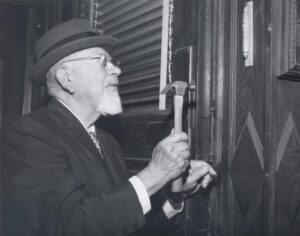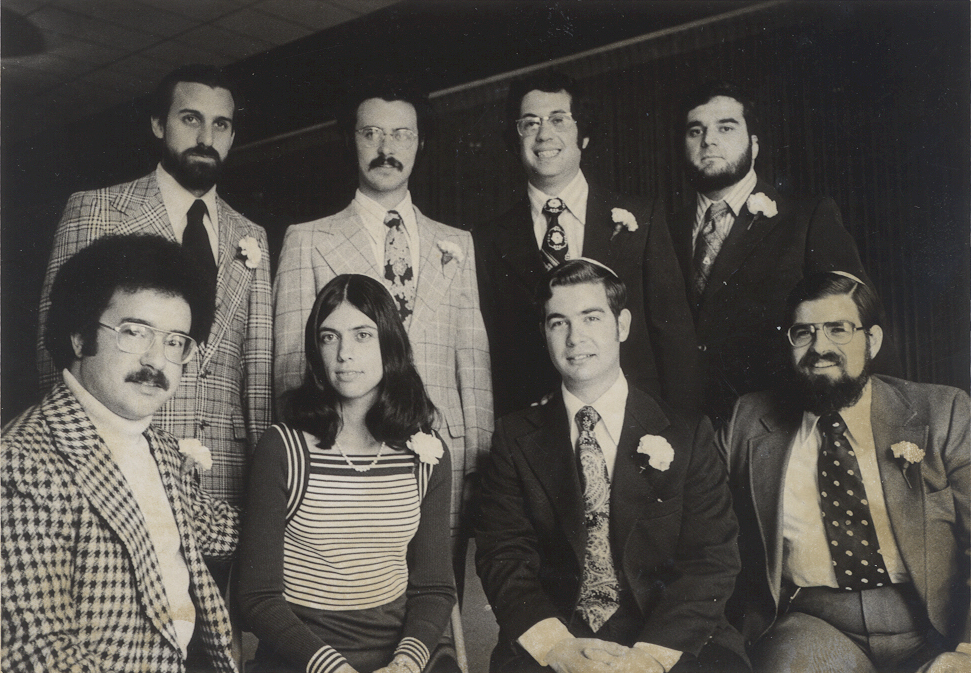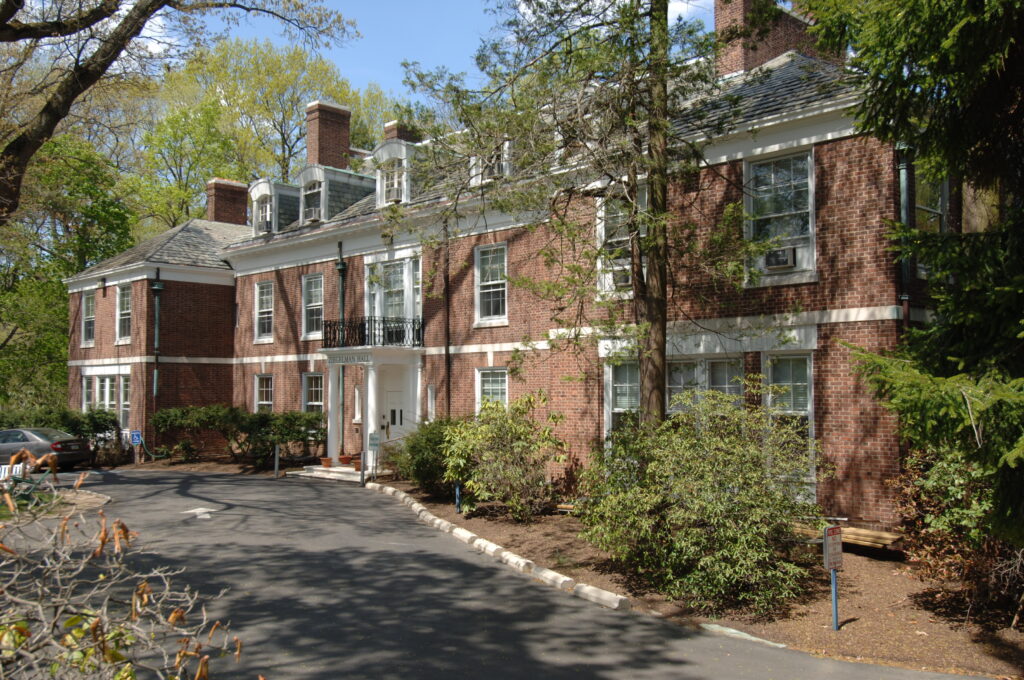Since its 1968 founding, the Reconstructionist Rabbinical College has trained generations of rabbis, grounded in the Reconstructionist approach to Judaism.
Reconstructionism understands Judaism as far more than a religion; it is a dynamic civilization characterized by vibrant diversity and ongoing change. Reconstructionist Judaism champions collective, democratic decision-making and aims for meaningful interaction with Judaism’s texts and tradition.
Rabbi Mordecai Kaplan (1881-1983) developed Reconstructionist thought as a response to the challenges and opportunities presented by American society. In 1922, Kaplan founded the Society for the Advancement of Judaism, the first Reconstructionist congregation. A few months later at SAJ, Kaplan’s daughter, Judith, became the first girl to have a bat mitzvah.
For many years, Kaplan sought to influence all of American Judaism and tried to quiet demand from followers to start a new movement. Still, as early as 1946, he was speaking and writing about the need for a new Jewish institution of higher learning — many of his disciples were eager to build a new movement. The Federation of Reconstructionist Congregations and Havurot was founded in 1955 with four charter congregations and a mandate to build Reconstructionist institutions.

The future rabbinical college would need an academic partner; Rabbi Ira Eisenstein, Kaplan’s son-in-law, and Kaplan believed that students should earn a doctorate in religion in addition to rabbinic training. In 1968, the Federation reached an agreement with Philadelphia’s Temple University to launch a joint program in which students earned rabbinical ordination and a Ph.D. in religion.
Later that year, for $25,000, the Federation purchased a former funeral home at 2308 N. Broad Street. The area around North Broad Street had once been a thriving Jewish neighborhood. However, by 1968, the neighborhood had already experienced significant white flight and was now largely Black, a reality captured in a headline in a headline in the Philadelphia Inquirer that read “Rabbi College opens in ghetto.”
RRC was dedicated on the Jewish holiday Hoshannah Rabbah, which fell on Oct. 13 1968. Kaplan, then in his 80s, affixed the mezuzah, and participants recited the shehekheyanu prayer. Classes began the following day. RRC held its first graduation ceremony in 1973: Rabbi Michael Lukens was the sole graduate. Though RRC’s founders intended to admit and graduate women, Eisenstein expressed reservations about including a woman in the inaugural year. However, in 1969, Sandy Eisenberg became RRCs first female student. A year later, she married classmate Dennis Sasso. When they graduated in 1974, they became history’s first rabbinic married couple.

Bottom row: Steven Stroiman, Sandy Eisenberg Sasso, Dennis C. Sasso, Aaron Peller
In the early years, many students focused on opposing the Vietnam War and advocating for gender inclusivity within Judaism. Though RRC was located in a center of Black activism, a recent examination of RRCs history found that in some ways, these years were a missed opportunity for students to interact with and learn from their Black neighbors.
In 1981, Rabbi Ira Eisenstein retired as RRC’s founding president and was succeeded by Ira Silverman, a communal leader and Soviet Jewry activist. A prodigious fundraiser, Silverman stabilized RRC’s finances and attracted new faculty, including Rabbi Zalman Schacter-Shalom and Rabbi Arthur Green (who, in 1986, would succeed Silverman).
In 1982, RRC relocated to its current home, a 1924 Georgian mansion formerly owned by Cyrus Curtis, publisher of The Saturday Evening Post. It sits in Cheltenham Township, which today is an increasingly diverse inner suburb bordering Philadelphia. In 1999, RRC completed a building expansion and added the Goldyne Savad Library Center, which holds faculty offices, the Mordecai M. Kaplan Library and the Ira and Judith Kaplan Eisenstein Reconstructionist Archives.

Archival research has found that in publicly discussing the need for a move, Silverman highlighted how the student body had outgrown the small building, and a larger facility would allow the college to blossom. In private and confidential correspondence, however, Silverman was more likely to refer to the neighborhood’s perceived lack of safety, a veiled reference to racial dynamics in North Philadelphia.
RRC was established as an egalitarian rabbinical program open to men and women. RRC is proud of its history of graduating rabbis with underrepresented identities. In 1985, RRC became the first American Jewish seminary to admit openly gay students, setting a precedent that other seminaries have followed. In 2015, RRC adopted a policy welcoming rabbinical candidates with non-Jewish partners, reflecting evolving Jewish family structures. Over time, RRC has been proud to accept Jews of color, Jews by choice, Jews with non-Jewish partners, and LGBTQ+ Jews, among others, recognizing the importance of a rabbinate that reflects the diversity of the Jewish people. RRC’s commitment to equity and inclusion has helped transformed Jewish American life and Jewish leadership.
RRC is deeply grateful to the students and graduates of diverse identities and backgrounds who served as trailblazers and were willing to put their trust in RRC as we learned how to create a highly supportive and welcoming learning environment–that work is ongoing and we continue to work in partnership with our students and other constituents in that endeavor.
Throughout the 80s and 90s, RRC continued to grow its student body and expand its academic and public offerings. Under its fourth president, Rabbi David Teutsch, Ph.D., (1993-2002) RRC established the Center for Jewish Ethics and Kolot: The Center for Women and Gender Studies. In 1996, RRC entered the internet era when RRC.edu went live. Five years later, it launched Ritualwell, which today is the most extensive online resource that curates original Jewish rituals for Jews and fellow seekers.
RRC’s 50th Anniversary Multimedia Showcase
In the scope of Jewish history, a half century is a blip. Yet viewed through our contemporary lens, the Reconstructionist Rabbinical College’s impact has been incalculable, eclipsing our size and resources, reflecting an enduring and bold vision. We’ve created a center of Torah-learning like no other, enabling ever-increasing numbers of people with diverse backgrounds, experiences and interests to fully experience Judaism. A hub of innovation, an academic institution, a professional training ground, a think tank and more.
We’re overjoyed to present a multimedia showcase, a way for you to experience (or relive) the RRC experiment as it has unfolded so far.
The Reconstructionist movement underwent a seismic shift in 2011 when the RRC and the Jewish Reconstructionist Federation (formerly the Federation of Reconstructionist Congregations and Havurot) merged, creating Reconstrucing Judaism, a new, central Reconstructionist organization. In 2014, Rabbi Deborah Waxman, Ph.D., succeeded Rabbi Dan Ehrenkrantz to become the college’s sixth and current president. Waxman, a 1999 graduate of RRC, became the first woman, and first lesbian, to lead a rabbinical seminary and congregational union.
The next year, under Waxman’s leadership, RRC faculty voted to admit and graduate rabbis married to non-Jewish partners. Though this move received criticism at the time, it has made the rabbinate more accessible and responsive to the needs of Jewish communities. Both Hebrew College and Hebrew Union College-Jewish Institute of Religion eventually followed suit.
In the 2020s, RRC has made racial justice a core focus. In 2021, Reconstructing Judaism adopted a strategic plan that committed to leading “Jewish efforts to dismantle systemic racism, and to advance racial diversity, equity and inclusion within the Reconstructionist movement.” Two years later, the movement passed a resolution supporting reparations and, in 2024, launched an initiative to explore the college’s own past from a racial justice perspective.
RRC’s rabbinical program has embodied the Reconstructionist commitment to transforming tradition in its periodic revisions of the curriculum. A “civilizational” approach remains the signature of a rigorous academic curriculum which is organized as a journey through Jewish civilization, from ancient Israel until the contemporary moment. Today, students prepare to meet the challenges of the current moment through an innovative fieldwork program that students in professional internships across the United States during their final years before ordination.





